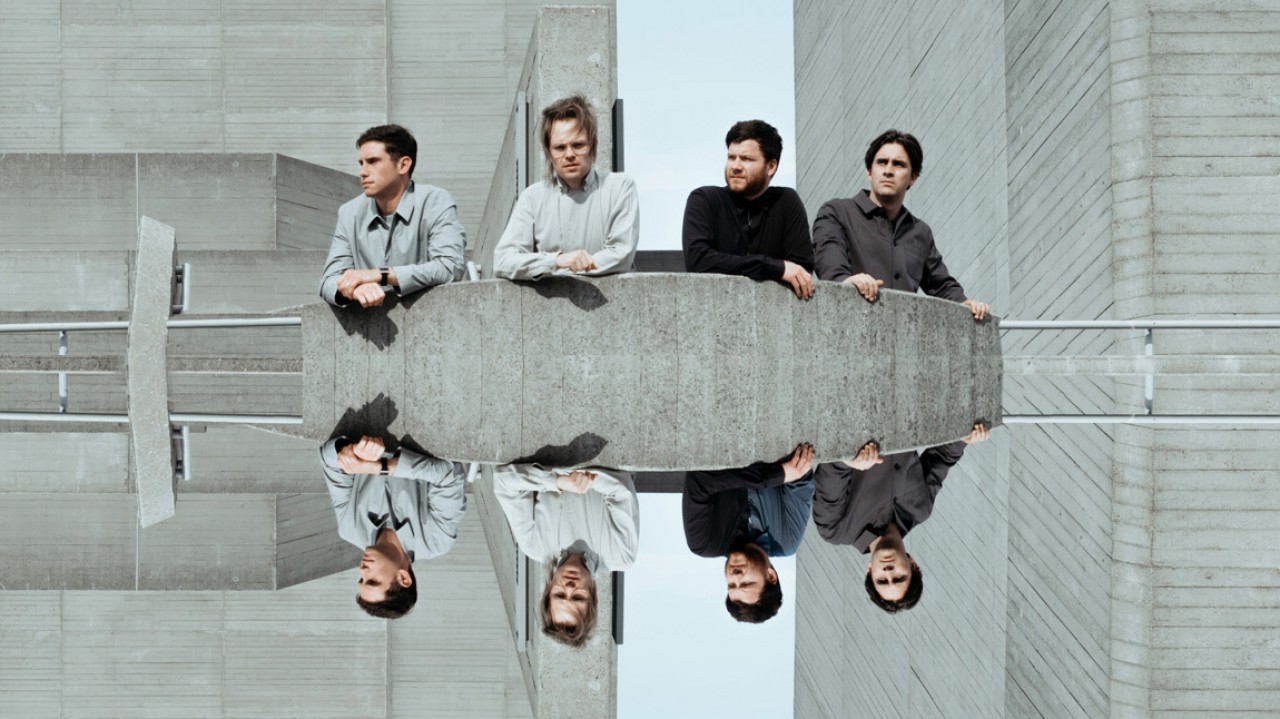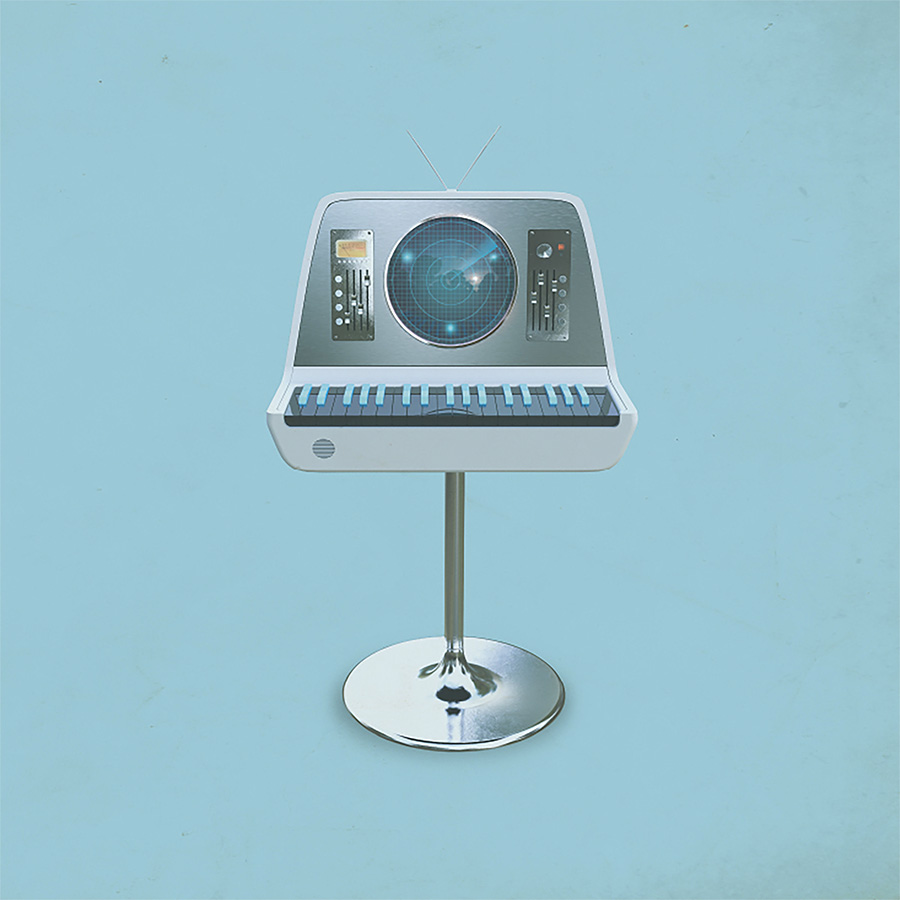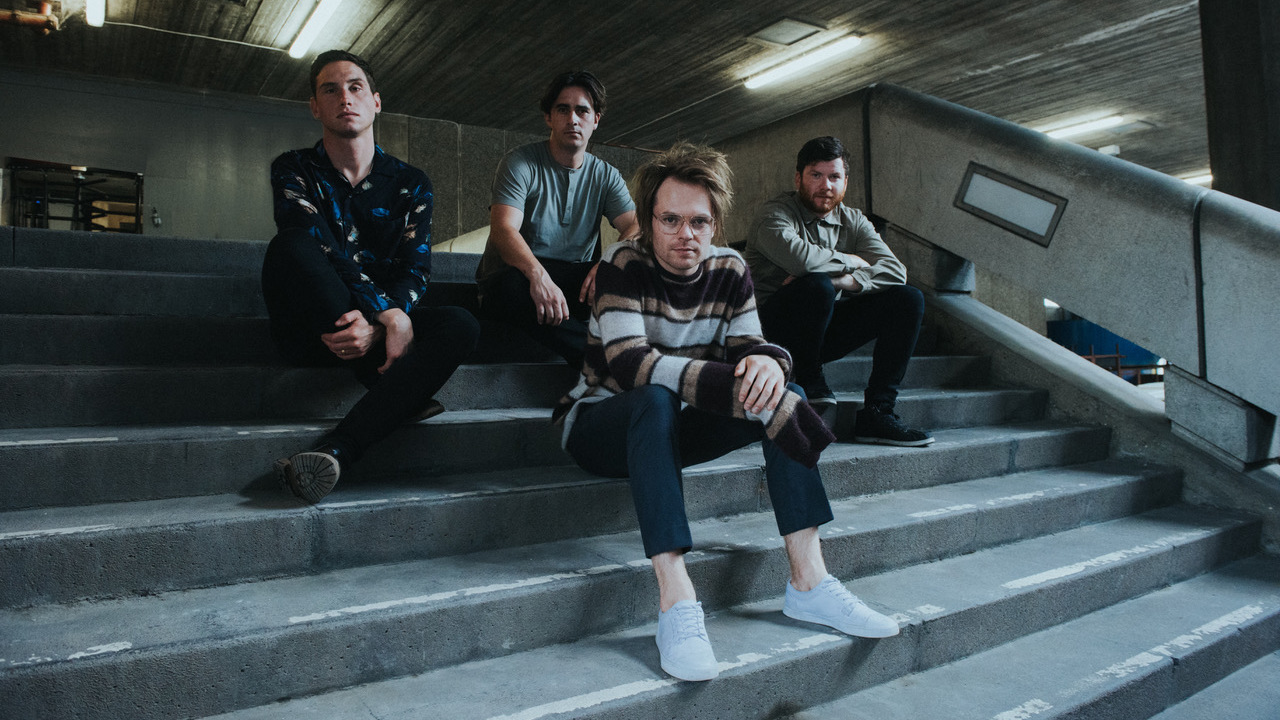“I didn’t sleep for a week, I thought I was going to die,” says Rou Reynolds, reflecting on the darkest period of his life, during which Enter Shikari’s new album The Spark began to form.
After losing his two remaining grandparents, Rou was hospitalised on the way to a Download festival warm-up show in 2015 as a result of a “ridiculous panic attack”, brought on by exhaustion and the side-effects of skin medication Roaccutane. This led to a three-month period of insomnia, during which time he split from his girlfriend of seven years. For the first time in his adult life, Rou was alone. But found solace in music.
“Having music there as that form of escapism from that shit was very helpful,” says Rou, sitting with TeamRock in The Heights restaurant in Central London, fifteen stories up. “It’s weird that a lot of the music was coming out positive. It’s a very British thing, to write dark, sombre lyrics against an upbeat melodic track. I found that came a big thing for The Spark.”
The Spark is Enter Shikari’s fifth album and a sonic shift from the bonkers soundclash for which they made their name. The jittering, bombastic synths and aggression have been replaced by shimmering poptastic textures and infectious melody. Opening tracks The Sights and Live Outside’s hooky choruses are designed for arenas, while Shinrin-yoku conjures a Plastic Beach-era Gorillaz instrumental. This is intelligent music from a band who made a career pushing boundaries to breaking point.
“It’s the first time I ever had an actual focussed idea of what I wanted it to sound like,” says Rou. Reflecting on the dark period of his life, he admits that he felt like he was being pushed to write an album that focussed on lucidity.
“Shikari songs often sound like five songs in one – intense and going down different garden paths – but our confidence had grown so much, and as a songwriter I wanted to push myself, and see what we could come up with that was different.”
Rou’s vocal approach has also changed, sounding much more accomplished and honed than ever before; he’s come a long way from yelping out Sorry, You’re Not A Winner eleven years ago. Admitting that he never considered himself a “frontman kind of guy,” Rou has never had any singing lessons and just used his vocals to convey passion onstage.
It was the death of of David Bowie that spurred on this desire to improve and harness his instrument, re-discovering the different Bowie eras and holding a Bowie-oke party in his flat for friends. Which carried on for weeks after.
“When you’re singing, you’re only singing your own stuff, but singing his music, because his range is amazing, pushed me as a singer, so melody became really important. As a songwriter I’ve got a lot more to prove and show people who would always just dismiss us.”

Cynically, this more melodic and accessible approach could be seen as a grab at the mainstream, but Rou states that it’s more of a reflection of what he’s into at the moment. And while musically this might attract more daytime radio plays, it is very much an Enter Shikari record, with biting socially conscious lyrics and an inherent angst about the status quo.
Throughout The Spark there’s an overwhelming feeling of escapism, initially coming from the headspace Rou found himself in while “everything was going to shit” allowing himself to hide in the aural realm and use it as a form of meditation, which is human nature; when you’re being attacked from all angles you want to run away.
But it’s not all negative. As he declares in The Sights, he will ‘boldly go into the great unknown,’ to find a new path and get his life back on track. It’s a declaration of empowerment, of resilience, no matter what the world throws at you. You will survive.
“Politically the last few years have just been crazy shock after shock,” says Rou, “you feel like you’ve been nudged off the path where you’re going and it’s about trying to get your bearings again. What are we rallying against? What is a progressive thinking person supposed to think about this?”
Of course, this wouldn’t be a Shikari album without at least one mention of Brexit. It comes in the caustic battle cry of Take My Country Back, with the line ‘I don’t want to take my country back, I want to take my country forward.’ But after all these years of liberal lyrics and pro-Left activism, surely the band are just preaching to the choir?
“That’s what the song is about, how we literally do do that,” says Rou emphatically, refilling his glass of water. “We surround ourselves with things we agree with and rarely open up to wider debates with other philosophies. On the internet you’re surrounded by things that you’re comfortable with and it’s a dangerous way to live.
“When you do come face to face with someone who not necessarily has the same views, it gets heated very quickly. You’re both so used to having everyone agree with you online, it’s impossible to have a conversation, it turns into a heated debate. It’s bred a nasty atmosphere. We’ve seen the rise of nationalism, in America and Europe, and as history has proven it’s a mindset that can get us in horrific situations. You close yourself off, you call everyone else a foreigner, it’s a cowardly, inwardly looking view, and it becomes an echo chamber.”
- Watch Enter Shikari's video for new track Rabble Rouser
- Rou Reynolds: My Life In 10 Albums
- Enter Shikari announce new album The Spark
- The 10 best Enter Shikari songs as chosen by Rou Reynolds
The Spark isn’t just pointing its finger at nationalists and Brexiteers. Music itself comes under close scrutiny from Enter Shikari on the song Rabble Rouser. Those amongst you who keep a keen eye on social media are no doubt aware of Rou’s Twitter spat with Taylor Swift fans after he criticised the ethics of her recent ticket lottery. But it’s not just the standards and practices of these Hollywood pop superstars that have riled the singer, it goes deeper than that.
“In the last 5-10 years, narcissism has put a blanket over a lot of pop, but what’s frustrated me the most is to see a lot of those ailments transported to the rock scene, the punk scene, the alternative scene. Instead of pop music being inspired by the niche genres, you’ve got the rock bands being inspired by this banal, useless fucking pop music,” says Rou exasperatingly, with his head in his hands. “It’s the worst thing that could possibly happen for art. You get crappy alternative music that just doesn’t provide an alternative.”
But considering the more accessible nature of The Spark, is it a pop record or a rock record?
“I don’t think anyone knows what those terms mean any more,” says Rou, laughing that he’s dodging the question. “If I had described our music at all as pop when I was 16 I’d have taken a knife to my throat, I’d have done anything to avoid that word, but in a way we were purposefully trying to not be in that world.
“Basically I see two types of music – music that connects people and music that disconnects people. Manufactured pop is a disconnecting type of music, because it creates such a divide between the performer and the audience, whereas the music I grew up on – punk/hardcore/ska/dubstep it was all about the scene, it was all about community, and that’s what I feel we’re trying to do.”
He goes on to reference linguist and Harvard psychologist Steven Pinker, who showed that as literacy levels go up, so does empathy, leading to a decrease in violence – which can be plotted on a graph over centuries. This ability to understand different points of view and to get inside the head of another person creates human connection, something real.
“Pop music can be an extension of that,” says Rou. “Worldwide literacy isn’t great, it’s pretty good, but with a song in three minutes you can be inside someone’s head and understand their world view. That’s what I consider good pop music and worthy, whereas there’s a lot of pop music that’s narcissistic, soulless and disconnecting. I have no problem being in the better box when it comes to pop music.”
In reality, Shikari exist in their own box. They are the archetypal hybrid band, pulling from various shades of the musical spectrum, not just those based in rock ‘n’ roll. In the early days, following their debut album Take To The Skies, there were a myriad of clones trying to replicate the Shikari formula, but misunderstanding it for metalcore mashed with synths.
Terms like rave-metal, electropunk and Nintendocore were thrown around as critics tried to pigeonhole the St Albans noisemakers, but there’s so much more to be found by not focussing on the electronics. Growing up on everything from The Beatles to Joy Division to Oasis to The Prodigy, all genre and era defining bands in British music, Rou wants Enter Shikari to be the next band in that lineage. A band who refuse to be categorised, always looking forward, the ‘bedrock of the new sound’ as they say in Rabble Rouser.
“We don’t have a signature sound, which is why The Spark so important to us,” says Rou. “We have that amalgamation of the past, present and future; guessing what’s coming next but also being inspired by the past makes the best music.
“Often with lamer forms of dance music, it’s so vogue, it dates quickly. The best example is dubstep now, it just sounds so 2013. Whereas good electronica, good rock and good pop is timeless. But we’re always trying to have that swathe of inspirations from all around,” says Rou proudly.
“Then again, a lot of Take To The Skies could only sound like 2007, so maybe I’m just chatting shit!” he laughs.
Earlier this year, Enter Shikari played their debut album Take To The Skies in its entirety at a handful of shows across the UK, something that Rou was initially against. But it reinforced the idea of community that has been with the band since the MySpace days. Three of the previous four Shikari albums have reached the Top 10 in the UK, and the band have a full arena tour lined up later this year (with quadrophonic sound). And they’ve done it all on their terms, on their own label, making the music that they want to make. It’s this honesty and determinism that has cultivated such a connection between the band and their fans.
“Because the music we make is so far from the middle of the road, to ‘get’ our band it takes effort,” says Rou. “Even The Spark isn’t something you can just listen to once and immediately become a massive fan of.
“I know that our fans have had to put a lot of effort in and I respect them so much, and that creates a connection. Immediately I know that they understand where I’m coming from, they understand what we’re trying to do. If you couple that with the punk/lessening the pedestals ethic, it creates a community that’s actually real. It’s not a culty 30 Seconds To Mars thing, it’s like ‘Come and say hello, let’s have a chat’. People respect that, and it encourages them to want to be a part of it.”

And perhaps that’s what sets The Spark apart from the rest of the Enter Shikari canon. Writing their most personal album to date has harnessed the true power of human emotion, something that we can connect with on a deeper level than singing about laser quest or UFOs. Everybody, from all walks of life, has been through hardship, heartbreak, loss and fear. Now, one of the most vital voices in UK music has written his experiences and emotions down into one cohesive, melodic record for the world to absorb.
“‘This too shall pass’ is such an important phrase, as is ‘Change is the only constant’,” says Rou on the philosophy that inspired The Spark. “We’re all in a constant state of flux. Everything is constantly changing, nothing stays the same. Going through a period of adversity will bring you knowledge and experience, and will bring you better capabilities of dealing with whatever it was if it does come back.
“Even though I wouldn’t wish that six-month period on anyone, I feel like I learned so much about myself, how to keep myself healthy, and balanced A lot of the record is seeing the positives that come out of negativity and knowing that you’re becoming stronger. I can’t say that everything will be worth it, but at least you’re growing as a human being.”
As our time comes to an end, we point to the lyric in Undercover Agents where Rou says he’s ‘still currently under construction’. Now time has passed, is he now closer to finished product?
“The moment you think you’re constructed then you’re probably just dead,” he laughs. “Everyday as people we learn and we progress, it’s just one ongoing thing.” He looks out over the grey skies of the capital, with Oxford Circus bustling below. “It’s like London, it’s never finished, there are cranes everywhere. I wouldn’t want it to be because then it becomes static and that’s everything our music is against.”
Enter Shikari’s new album The Spark is out now and available to order from Amazon.
